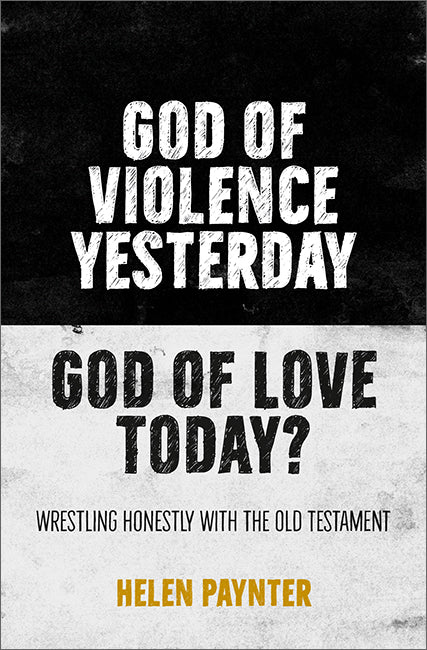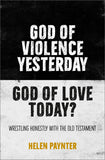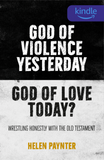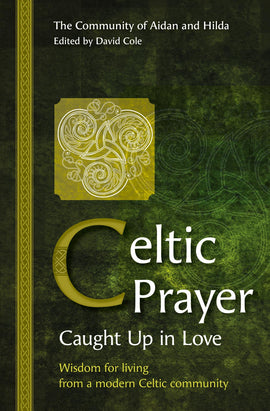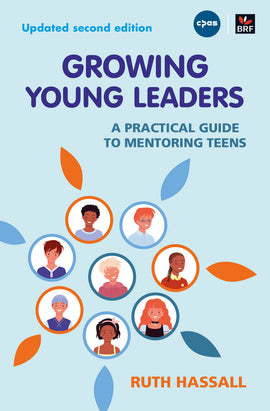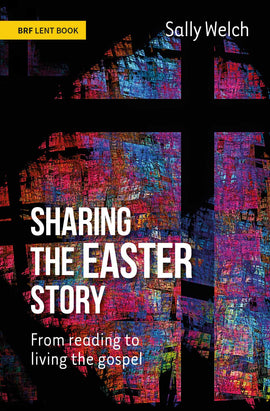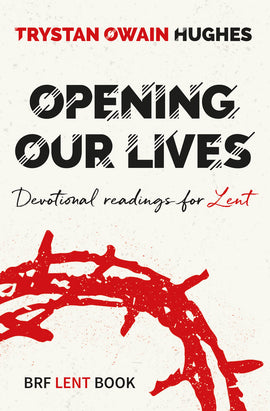God of Violence Yesterday, God of Love Today? Wrestling honestly with the Old Testament
Gain confidence in the Bible and the God it portrays
Do you find the violence in the Old Testament a problem?
Does it get in the way of reading the Bible – and of faith itself?
While acknowledging that there are no easy answers, in God of Violence Yesterday, God of Love Today?, Helen Paynter faces the tough questions head-on and offers a fresh, accessible approach to a significant issue. For all those seeking to engage with the Bible and gain confidence in the God it portrays, she provides tools for reading and interpreting biblical texts, and points to ways of dealing with the overall trajectories of violence.
Free materials for groups - View resources
| Title | God of Violence Yesterday, God of Love Today? Wrestling honestly with the Old Testament |
| Author | Helen Paynter |
| Description | Do you find the violence in the Old Testament a problem? |
| Details |
|
Do you find the violence in the Old Testament a problem?
Does it get in the way of reading the Bible – and of faith itself?
While acknowledging that there are no easy answers, in God of Violence Yesterday, God of Love Today?, Helen Paynter faces the tough questions head-on and offers a fresh, accessible approach to a significant issue. For all those seeking to engage with the Bible and gain confidence in the God it portrays, she provides tools for reading and interpreting biblical texts, and points to ways of dealing with the overall trajectories of violence.

Following a first career in medicine, Helen Paynter is now a Baptist minister, Director of the Centre for the Study of Bible and Violence at Bristol Baptist College, and Editor of BRF’s Guidelines Bible reading notes. Helen is passionate about helping people to get to grips with the Bible because she has seen its power to transform lives. She loves to study it, preach it, teach it, and encourage others to study and understand it.
Paul Copan, Professor of Philosophy and Ethics at the Palm Beach Atlantic University, the author of 'Is God a Moral Monster?', and the co-author of 'Did God Really Command Genocide?'
Helen Paynter’s exploration of Old Testament ethical challenges is insightful, balanced and honest. I appreciate the fact that she does not deny divine severity while putting in perspective God's goodness. She admits that she is still wrestling and learning, as indeed I am. She humbly but boldly approaches an array of key topics and she writes with deep pastoral concern. Her treatment of the imprecatory psalms is particularly effective and illuminating. While I have a few quibbles here and there, I want to emphasize the spirit, the breadth, and the balance of this book. It sheds light on a complex and controversial subject, encouraging further conversation and deeper understanding.
The Rev'd Dr. Lissa M. Wray Beal, Professor of Old Testament, Chair, Seminary Bible and Theology Department, Providence University College and Theological Seminary
In God of Violence Yesterday, God of Love Today? Honestly wrestling with the Old Testament, Helen Paynter tackles problematic texts of violence in the Old Testament. The questions Paynter asks are pressing ones today, and she sketches out the complex issues clearly but without undue oversimplification. Outlining valuable principles of interpretation and applying them in worked examples, the author’s candor and pastoral attentiveness invite readers into the conversation. The volume models Christian engagement with the biblical text and shows the value of honest wrestling within the text’s own vision of shalom. Providing tools to think not only about specific texts of violence, but the biblical text more broadly, it is a welcome and compact initial resource for Christian laypeople troubled by biblical texts of violence.
John Meredith Editor of Word & Worship, the publication of the NZ Lay Preachers Association
In lucid prose Helen Paynter argues that violence featured in the biblical canon should not be ignored or denied but acknowledged and faced honestly. While history is played out in a broken and often violent world the author shows how the movement of scripture is toward God’s creative intention for healing and wholeness. Without providing final answers Paynter offers ways of interpreting even the most violent passages so that we may hear God’s word for today.
Reviewed by Natalie Collins, gender justice specialist: see www.nataliecollins.info Tweets as GodLovesWomen and wrote Out of Control: Couples, Conflict and the Capacity for Change
This relatively small book faces some massive theological questions about the nature of violence in the Old Testament. Exploring different types of violence in the Bible, including that against animals, and perhaps the most troubling, when it appears that God commands genocide, Helen Paynter expertly guides us through complex theological terrain and explains this complexity in down to earth and easily accessible ways. This book is ideal for someone with no
theological training to begin exploring challenging elements of the Bible, with those with formal theological training also able to learn from her. Those in church leadership should read this book so they are able to recommend it to their congregations. While challenging, the book seems to be pitched to a conservative 'Bible believing' audience, which may jar with those who have a more liberal approach to Scripture, but overall it’s a great, engaging, manageably short book. As Helen says, she can’t wholly resolve the tensions of the most problematic texts, but she does give much food for thought and some
tools for Christians who want to more ably identify where God is in the text and what God is saying to us through it.
Reviewed by Natalie Collins
Theology 2019, Vol 122(6). Review by Robin Gill
Helen Paynter is a Baptist minister and director of the new Centre for the Study of Bible and Violence at Bristol. This accessible and refreshingly honest paperback, published by The Bible Reading Fellowship is very welcome indeed. It examines carefully some of the most troublesome texts in the Old Testament and it does so in stages, as she explains:
'First, we will consider instances where violence is described, not prescribed. Next we will look at places – mainly the psalms – where violence is implored: where the psalmist prays for vengeance. Third, we will consider the issue of violence against animals, particularly the flood story and the system of animal sacrifice. Fourth, we will look at the use of violence as divine judgement. And fifth, we will look at the knottiest problem of all: the texts where God appears to command people to be violent to one another. At the end of most of the chapters in this section I offer some more practical suggestions. How should we handle these texts in our churches – in our pulpits, our home groups, our Sunday schools? And then, in the final chapter, we will ‘zoom back out’ and take a look at the big picture of the bible.'
There is nothing particularly novel about any of this, but that is not the point. Her message needs to be heard in a context of widespread fear of religiously inspired violence. This small book and her new Centre make an excellent contribution to greater understanding.
Reviewed by Robin Gill
Anabaptism Today Autumn 2019. Review by Alexandra Ellish
Many people from both within and outside of church communities are confused and uncomfortable with accounts of violence in the Scriptures, and the all too frequent appeal to biblical sources to justify modern-day warfare, military action and the ownership of weapons. In this helpful and accessible book, Helen Paynter seeks to address some of the questions and issues raised by texts containing violence in the Old Testament and considers how we might interpret and understand them today.
The book is divided into two sections. Part One sets out some essential foundations – reading the Bible as God’s word; defining and understanding violence within the ancient world; and some possible tools for interpretation. The second part of the book considers five types of violence, ranging with increasing complexity from: texts with descriptive versus prescriptive accounts of violence; texts imploring the use of violence; the sacrificial system and a consideration of the flood; violence as used in accounts of divine judgement; and finally texts in which God seems to be commanding violence.
When reading violence contained in the psalms, the author notes the importance of paying attention to the psalmist’s use of language – particularly allegory and metaphor – to argue for a deeper reading of the texts. While there are psalms calling for God to punish enemies, this desire is usually held in tension with an acknowledgement of ultimate trust in God’s wisdom and sovereignty. Paynter suggests that psalms which implore God to use violence to exact vengeance on enemies or oppressors have cathartic value in the context of communal worship – that these psalms remind us that we can bring all of our experiences and humanity to God in worship. Paynter advocates using the imprecatory psalms in worship today by depersonalising the ‘enemies’ of God and people to include issues around ecological catastrophe, serious and debilitating illness, domestic violence and all things which result in death. As the church frequently draws on the psalms of joy and thanksgiving for times of celebration and praise, this encouragement takes seriously the possibility of expressing painful, difficult and angry feelings that we have, in the context of a community of faith which trusts that God is in charge and loves his people.
The fourth chapter considers violence in divine judgement as a reminder of the nature of God as a just judge who is our friend and ‘brother’ but is also ‘unbearable’ in his holiness. Paynter discusses the positive aspects of the law of talion which, she argues, Jesus extends rather than repudiates. The penultimate chapter is devoted to texts where violence is explicitly commanded by God. This chapter covers the most difficult passages, where Paynter untangles the complexity of defining the word ḥerem. This word is often translated as ‘utterly destroy’ or ‘devote to complete destruction’ but its meaning is somewhat veiled. Paynter suggests that ḥerem ‘does not always involve killing or destroying’ but that ‘ḥerem sometimes involves killing’ (p. 128). She states that she cannot offer a definitive answer to the questions surrounding conquest and apparent mass killing, but that the word ḥerem is used for rhetorical and hyperbolic purposes to portray events in a particular way in the ancient world. Paynter’s honesty and humility in the recognition that her offering might be only partially satisfactory and her desire to continue to ‘nibble’ (p. 153) at the issue alongside others is immensely refreshing and rare!
In the final chapter, Paynter considers the arc of the biblical narrative and argues that the vision of God demonstrated throughout the Scriptures is for shalom for all of creation. While I was pleased to see the concept of shalom included in the book, I thought that more could have been made of this subject and how we might understand shalom in relation to violence in the Old Testament. Similarly, in an early chapter the centrality of the life and person of Jesus as a lens for interpretation is briefly mentioned but not elaborated. Since I come to the topic of violence with Anabaptist convictions, perhaps it is no surprise that I would have enjoyed a fuller consideration of these subjects earlier in the book, instead of waiting until the final chapter for a somewhat limited exploration of the concept of shalom.
Paynter assumes that the value of the image of the eating of the forbidden fruit in the garden of Eden and the subsequent ‘fall’ is to explain the entry of death, competition and violence into the world. This understanding all too easily reduces Jesus to nothing more than a rescuer come to reverse the fall. I am not sure how helpful this is. Shalom is the narrative arc of our Scriptures; Jesus who is the Christ is/was, in my view, always going to be the incarnation of God on earth as a pattern for humanity. This impacts how we understand the crucifixion of Jesus, and I would have been interested to read more from Paynter on this issue. Particularly for our western Protestant tradition, which has largely abandoned other atonement theories to focus on the (arguably violent) theory of penal substitution, are there more appropriate ways of exploring and articulating the crucifixion and resurrection of Christ which fulfil rather than undermine a shalom narrative?
Paynter is categorical in her rejection of the appropriation of violence from the Old Testament texts for today, and also touches very briefly on the inappropriate conflation of the historic nation of Israel and the modern state. More on this issue would have been instructive, particularly as many pro-Israel churches support the government and its policies of occupation in Palestine based on their understanding of texts from the Old Testament.
I found Paynter’s writing style clear and engaging. She uses interesting and relevant examples to illustrate the issues she is dealing with, often drawing on contemporary stories. It is clear that Paynter is passionate about the importance of the Old Testament for personal and corporate faith today, and she argues persuasively for and offers numerous practical suggestions for wrestling with the Scriptures communally and individually. Paynter also suggests a wide range of other books for the reader to delve more deeply into the issues she has raised. I look forward to further publications from Paynter as she continues to wrestle with the Bible, in search of fresh insight and understanding to inform our discipleship.
Reviewed by Alexandra Ellish, London
Baptist Ministers Journal. Review by Pieter J Lalleman
This book is timely, courageous and good. I therefore strongly recommend it to you and your church members. Revd Dr Helen Paynter of Bristol Baptist College has tackled one of the hot issues of the moment, the violence in the Old Testament (OT). It’s unlikely that you have not been asked about this by someone within or outside your congregation; if not, you’ll get the question soon: ‘How can a loving God condone and even order so much violence?’ Paynter helps you to give a Bible-based answer. She does not follow the common escape routes of either denying that this is what the OT really says or ascribing the violence to human authors who had not quite understood God. Instead she listens attentively to what the OT really says.
The book is in two parts, the first of which is a general introduction to the Bible and how to read it well. Paynter explains that her approach will be biblical and Christocentric, and she defends the position of the OT within the Christian scriptures. As a potted hermeneutic this part of the book has a more general value. For example, readers learn about the various genres in the Bible and about the distinction between description and endorsement. Here we also find a useful chapter on what violence is.
In the second part Paynter tackles the OT in concentric circles, beginning with the relatively simple texts in which violence is merely described. This is followed by texts in which violence is deplored, psalms which call upon God to use violence, texts about violence against animals and texts in which the use of violence is part of a divine judgement. Throughout her discussions are careful and helpful. Paynter’s response to the usual argument that the Canaanites deserved to be punished for their wickedness was a surprise to me; if you want to know what it is, buy and read the book! The final chapter, intended as a positive counterpart to the preceding misery, deals with God’s plan of shalom for his good creation.
Throughout Paynter’s tone is humble. She is honest about her own struggles and about points where she is uncertain. She refers to the book of Joshua as something that ‘feels alien and disturbing’.
For the most part, the book is easy to read; at times it is almost basic, which means that it is largely right for many church members. At the end of the chapters there are summaries and the notes are tucked away as end-notes. Some may find it uncomfortable that Paynter describes the flood as a myth (94-95), but that should not distract anybody.
So it is a perfect book? No, because it contains some typos and there is no index of texts. Some elements of the discussion might still be complicated for ‘lay people’. I would also have liked to read a bit more about the character of God. But these minor quibbles are just that: minor quibbles.
Review by Pieter J Lalleman
Preach, issue 20, Autumn 2019. Review by Tom Wharin
This is the third book I’ve read on the subject of violence in the Bible in the last couple of years and it is also the most helpful. God of Violence yesterday, God of Love Today? Has a clear and helpful structure even if the title is a bit of a mouthful. Helen Paynter starts by laying out her unapologetically Christocentric hermeneutic (to which I also subscribe). She then works through the biblical texts containing violence, from the ones she regards as least troubling (violence implored by the writer) to the ones she considers most troubling (violence commanded by God).
The book does contain plenty of literary and historical-critical arguments which won’t appeal to a wide popular audience but Helen Paynter is very readable. Theological concepts are well explained with reference to everyday events, familiar news and historical stories. In addition to her marshalling her own thoughts well, Helen Paynter draws on and explains some of the best arguments in John H. Walton & J. Harvey Walton’s and Greg Boyd’s books (among others) in a way that makes them more accessible to readers like me than the originals.
As an apologia for violence in the Bible to twenty-first century western culture, the book as a whole feels like a pretty solid bridge two-thirds of the way across a cultural canyon. The reader is left with more construction to do on either cliff or both, and the author honestly acknowledges this as our work and hers in the introduction and conclusion.
I will definitely be recommending this book to anyone from sixth form up who is serious about engaging with God’s word on this subject. The structure will make it easy to dip back into for sermon references and it will serve very well as an introduction to this area of apologetics.
Reviewed by Tom Wharin
Methodist Recorder 16 August, 2019. Summer paperback roundup by Cavan Wood
In God of Violence Yesterday, God of Love Today? the author Helen Paynter has tried to tackle one of the most difficult questions of biblical theology. Why is it that the God of the Old Testament seems to sanction war and what we might today call ethnic cleansing, while the God of the New Testament seems to be all about love? This simple stereotyping of the argument is well dealt with, giving us many ideas to reflect on. She does not come to easy answers, but you will feel considerably better informed. This is a book to read a couple of times and perhaps to share with a reading group to think through the many issues that it raises.
Cavan Wood
Review by David Ball, GOLD Project, July 2019
This short book deals with one of the thorniest subjects for Christians who believe that God is love and at the same time believe that the Christian Scriptures in their totality are God’s word to us. Helen Paynter does not shy away from any of the challenges that passages of violence in the Scriptures, particularly the Old Testament, bring to a theology of God’s love.
Part one introduces us to some key skills for interpreting the Old Testament. God’s goodness and the ultimate revelation of this in Jesus Christ sets the theological foundation by which we are to interpret the Scriptures. From this starting point, we are ably guided through what we do and what we don’t mean when we speak of the Bible as God’s Word to us. Here the indispensable place of the Old Testament for our Christian faith is emphasised. If we need a clear theological foundation to interpret the Bible responsibly, we also need a clear understanding of the issue we are dealing with. For this we are led through a careful discussion of the complexity of violence and how it manifests itself in society. This prepares us to look at the nature of the Old Testament and especially the challenge to understand the worldview of its writers and audience which is so often far removed from our own. Reading each passage of the Old Testament in the context of the big story of Scripture, understanding the type of literature that we are reading and wrestling with the meaning of the text are all key skills to hearing the message better. Another important reminder is to let different and apparently contradictory narratives or themes contribute to the big picture of how Scripture conveys a multi-layered voice on key issues such as human kingship. All of these skills prepare us to address the particular issue of violence and the Bible in more depth.
Part two does precisely this. Here we engage with the texts of violence under five (increasingly problematic) headings: Violence described, Violence implored, Violence against animals, Violence as divine judgement, Violence commanded. In each of these chapters, a clear attempt is made to compare and contrast the biblical context with our own and to draw out the significance of texts for our own day. We are carefully guided through the different types of violence each of which demand a different response. For example, describing violence in both the Old Testament and our own day does not necessarily endorse it. On the contrary, it often gives a voice to victims who would otherwise be denied justice and a hearing. Imploring violence is better than actual violence and is not necessarily endorsed by the text either. As we are led into the more problematic aspects of violence in the Old Testament, we are necessarily introduced to more technical aspects of biblical interpretation. Nevertheless, these are explained clearly. While not everyone will agree with some of the readings of the Old Testament, what becomes clear is that it is possible to grapple with even the most difficult Old Testament texts and not lose our integrity as those who believe in a just and loving God revealed in the totality of our Scriptures.
The final chapter seeks to bring a resolution and explain that the trajectory of the biblical narrative is towards the biblical idea of shalom. Normally translated ‘peace’ the ‘core meaning relates to completeness or intactness and the range of meanings includes prosperity, welfare, good relationships, deliverance and health’ (p.157) It is a vision of this shalom that drives the narrative of the Bible forward from its beginning in Genesis to its conclusion in the New Testament book of Revelation.
The skill of interpreting the Bible responsibly in today’s world is one that anyone can learn. It is not easy and involves a struggle, but, above all, this is the significance of this book. For, while it addresses the particularly thorny issue of violence, it does far more than this. It gives us a practical model of how to wrestle with difficult issues in the Bible and society, seeking to listen to each text within the big framework of Scripture and to understand how this relates to our own context. Through this process, we can learn the skills of hearing God’s voice for today even in the difficult parts of the Bible.
Reviewed by David Ball, GOLD Project
Reform July/August 2019. Review by Catherine Ball
This is a particularly apposite book for our current political situation. John Lennon wrote the song ‘Imagine’, longing for a peaceful world, assuming that religion is one of the main causes of conflict. It would be lovely to be able to say that Christian scriptures do not advocate violence, or that only the Old Testament shows God as angry and violent. The temptation is to avoid difficult and violent Bible passages. Yet, the Old Testament is an essential part of the Christian scriptures. Helen Paynter shows that it is too simplistic to separate the Old Testament from the New.
Paynter acknowledges that violence is apparently directed and endorsed by God in Old Testament texts. In an intellectually rigorous and accessible way, Paynter wrestles with each text to show that in many cases, the violence may become more understandable, and in some cases may be fully explained. She shows that each story needs to be carefully read in the context of ancient Hebrew language and culture.
For example, Paynter compares the battle of David and Goliath (1 Samuel 17 – in which David beheads Goliath – with Adam and Eve’s temptation by the serpent (Genesis 3). In both stories, there is a battle that will determine who has dominion and an evil force mocks God’s favoured. In the latter story, God curses the serpent and says that he will bruise the serpent’s head. God will have victory in the end. Though David – God’s chosen king, descended of Eve – is mocked by the giant who defies God, he is victorious. The pattern points to a greater king to come.
Paynter warns of the need to be careful how these passages are taught to children, and how they are used in preaching. This is an exceedingly helpful book for anyone who wants to honestly teach and preach the scriptures for contemporary society, affirming God’s plan for peace in the world.
Reviewed by Catherine Ball, Minister of the Free Church, St Ives, and Fenstanton URC, Cambridgeshire.
Progressive Voices Issue 30,September 2019. Review by Ray Vincent
Helen is Director of the Centre for the Study of Bible and Violence at Bristol Baptist College and the new Editor of BRF’s Guidelines Bible reading notes. She is well placed to write this very accessible book. She deals with the problem in a very straightforward, systematic way, beginning with the less difficult and moving on to the most difficult ones.
First she considers the places in the Bible where violence is simply described as part of the story. Then she moves on to where suffering people pray for vengeance on their oppressors – a natural human reaction. Next, violence against animals, pointing out the huge cultural difference between the Bible’s world and ours. Then she tackles violence as divine judgement, and finally the most difficult problem, the places where God seems actually to command acts of violence against innocent people.
Paynter approaches the problem humbly, freely acknowledging that she does not have the answers but is still wrestling with the questions. However, it seems to me that her perception of the violence as a ‘problem’ comes from her relatively conservative view of the Bible as the Word of God. While acknowledging the humanity of the Bible and reading it in the light of critical scholarship, she seems nevertheless to be trying to justify everything it says, and hesitates to say that parts of it may be simply mistaken.
I suspect that the way in which most of us perceive the Bible means that we do not see the violence in it as a ‘problem’ in this kind of way. At the same time, this book is clear, honest and admirably arranged. It is well worth using as a basis for discussion in churches. Some Progressive Christian Network groups too might find it useful. It is informative, reminding us of parts of the Bible we sometimes neglect, and it is thought-provoking and sometimes challenging.
Reviewed by Ray Vincent
Review by David Mitchell, Pastor, Woodlands Church, Bristol. May 2019
Helen has written a book on one of the most difficult questions Christians face. In it she has managed to be both accessible, compassionate and scholarly as she navigates the tension between a high view of scripture and yet its depiction of God’s apparent actions and decrees in ways which offend our most basic instincts of what is good and loving.
She begins with a really helpful guide to reading the bible well whatever (and wherever) the biblical text is addressing, which I would commend to any serious reader of the bible, especially those coming to it fresh. She goes on to deal specifically with the issues of violence, not just to people; animals are included. She gives really helpful cultural context to hard passages without ducking some of the difficulties and ambiguities that remain even for her.
She invites us foundationally to see Jesus as God’s last word on the issue of violence and to read the Old Testament not just as a foundation for the revelation of Jesus but as sacred texts which He provides the ultimate guide to understanding.
Review by Andy Goodliff, May 2019
Helen Paynter is a Baptist minister and Old Testament scholar based at Bristol Baptist College. This is her second book. Her first, a version of her PhD, was Reduced Laughter, looking at how to read the books of 1 & 2 Kings. This second book, written for a broad audience, engages with the thorn of subjects violence in the Old Testament. It arrives at the same time as the work of the Centre for the Study of the Bible and Violence (CSBV) begins, of which Paynter is the Director. The book comes in two parts. The first establishes some 'foundations' — reading the Bible as God's word, how to read the Bible well and what is meant or encompassed by the word 'violence.' The chapter in reading the Bible well is especially helpful in offering some important lessons. The second half of the book seeks through 5 chapters to engage with the most serious of questions around the Old Testament and violence.
These 5 chapters make a series of important points. When violence is described, it is not always (often?) being endorsed. An example is given in the story of Samson. Paynter provides a different way of reading the book of Judges that pays attention to how the book is narrated. When violence is implored, as is the case of a good number of Psalms, there is a cry for justice and handing over of that desire for vengeance to God. Violence against animals is not as wanton as might be supposed. Paynter offers some helpful readings of the story of the flood in Genesis 6-9 and the place of sacrifices within Israel's worship. The fourth and fifth chapters explore violence as divine judgement and violence as commanded (e.g. the herem passages in Joshua). These questions are more difficult to address, and Paynter acknowledges, that this is not her last word on them, but almost a first foray into these questions, in conversation with wider scholarship. She takes us carefully through the importance of justice, the meaning of the law of talion (eye for an eye), a reading of the death of Uzzah (2 Sam 6) and in the latter chapter the meaning of the word herem.
A final chapter suggests that God's great plan in the Old Testament is shalom (peace) and we read it with trajectory in mind.
This is an excellent book, which wears its scholarship lightly. Paynter has a great way of explaining and the book is an easy read, although exploring difficult questions. The book seeks as its subtitle suggests to 'wrestle honestly' with the violence found in the Old Testament. It doesn't have, and doesn't promise, a magic solution, but does show that a surface level reading will miss or overlook at more subtle ways the Bible describes and responds to violence. I look forward to future explorations that I'm sure will be forthcoming from Paynter and the CSBV that will continue to reach a broad audience.
Review by Andy Goodliff. Click here for blog.
Review by Peter King, Diocese of Chichester
Over the past few years I have become increasingly troubled by the violence in the Bible. Although this is a subject we don’t often talk about in our churches, I know from a number of informal conversations that many churchgoers (and others) have questions they would like to explore on these issues.
Published to coincide with June’s inaugural events of Bristol College’s Centre for the Study of Bible & Violence, Helen Paynter’s new book offers a rigorous yet accessible exploration of Old Testament violence ideal for individuals or groups wishing to engage with these troubling texts and the issues they raise.
The book is divided into two parts. The first part offers valuable groundwork on the nature of the Bible and the nature of violence, and concludes with some very helpful suggestions on 'Reading the Bible well'. It is good to be reminded that the reason that texts of violence disturb us is because of our core belief that God is good. It is important, too, to be made aware that just because the Bible describes violence this does not necessarily mean that it commends it.
The second part identifies a range of types of violent text, and discusses these in ascending order of importance from what is termed 'Violence described' through 'Violence implored' and 'Violence against animals' (sacrifice) to 'Violence as divine judgement and what is the standout case for most people Violence commanded. I found this a very helpful way of classifying the different examples of violence in the OT. Each chapter concludes with some thoughts on how the type of texts under discussion might be read and used in churches today. Here I was particularly struck by what the author sees as the pastoral implications of ignoring the texts of 'Violence described'. By ignoring these stories of interpersonal and sexual violence we risk silencing those for whom they are a reality in their lives today. Yes, indeed.
The book concludes with a chapter entitled 'Shalom: God’s great plan', which puts the violent texts in the context of what is arguably an even more significant OT theme.
The author herself acknowledges at the end of the chapter on 'Violence commanded' that 'there might be more to say' on these most troubling of all the texts of violence. Not everyone will agree with the suggested interpretation, but I hope that all will agree on the important suggestions for reading them 'with ethical integrity' both in our churches and beyond.
I would wholeheartedly recommend this book to anyone interested in the questions it explores. If you are new to the subject, it offers a comprehensive introduction and the reassurance that you are being guided by a capable and safe pair of hands as you begin to engage with challenging and important issues. If, like me, you are familiar with some of the literature on the subject, reading it will surely bring new insights and ideas.
Peter King trained at Bristol Baptist College and now works for the Anglican Diocese of Chichester in adult theological education.
Word & Worship, journal of the New Zealand Lay Preachers Association, Winter 2019 (June). Review by John Meredith
Helen Paynter addresses the question of biblical violence honestly and without proposing any final answer. She is clear that what is in the scriptures should be neither hidden nor denied and that the Old Testament God of judgement should not be contrasted with the New Testament God of grace.
Paynter recognises that while violence may be deliberately aggressive it may also find expression through oppressive social structures. Colonisation and cultural devaluation are examples of this. Violence may also be associated with polarising rhetoric. We need think only of the ‘war on terror’ against nations defined as evil. We should not think that violence may be consigned to savage antiquity from which we have moved on. It is still possible to think that with bombs, rather than swords, we are doing God’s will.
As we consider episodes of violence in the Bible, Paynter invites readers to reflect on the narrators’ purposes. For example, in Judges 19 we find the gang rape and murder of a concubine. This is deeply shocking, but also draws attention to the appalling consequences for a defenceless woman in a society without law or leadership. Although part of the biblical text, such stories are not usually read in public worship, yet the airing of such stories may allow women who have experienced sexual violence to feel heard and present opportunities for pastoral care.
Biblical writers recognise the reality of emotions such as anger and desire for revenge arising within the human heart. But rather than being encouraged to give reign to free expression of such emotions we are invited to leave vengeance to God who is just and merciful. The concept of ‘an eye for an eye’ should, Paynter believes, be understood as defining the limitation of personal vengeance, a limitation which Jesus extends.
Modern sensitivities may cause us to shudder at the conquest of Canaan recorded in the book of Joshua where slaughter seems to be commanded by God. Rather than a literal record of history Paynter suggests the story may be understood as a type of biblical literature dealing with God bringing order out of chaos and affirming the identity of Israel as God’s covenant people. This does not mean, however, that it can be used to support modern Israel’s actions towards Palestine.
In the Hebrew mind God was awesome in holiness with power to create and to destroy. The stories of creation are placed at the beginning of the Old Testament as affirmation of God’s perfect design and intention for universal shalom/ wholeness. History is played out in a broken and often violent world, but the law and the prophets point to God’s creative intention for healing and wholeness and this is fulfilled in Jesus Christ.
It is not for us to edit from the Bible what offends us. We must learn to read with understanding. Helen Paynter writes clearly and makes a major contribution to informed reading so that we may hear and interpret God’s word for today.
John Meredith was ordained in the Methodist Church of New Zealand and has completed post-graduate study at Spurgeon’s College, London. John has served in pastoral roles in New Zealand and Western Australia. He is currently editor of Word & Worship, the publication of the NZ Lay Preachers Association and reviews books on theological and biblical themes.

